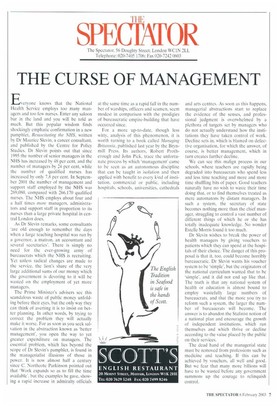THE CURSE OF MANAGEMENT
Everyone knows that the National Health Service employs too many managers and too few nurses. Enter any saloon bar in the land and you will be told as much, But this popular wisdom finds shockingly emphatic confirmation in a new pamphlet, Resuscitating the NHS, written by Dr Maurice Slevin, a cancer consultant, and published by the Centre for Policy Studies. Dr Slevin points out that since 1995 the number of senior managers in the NHS has increased by 48 per cent, and the number of managers by 24 per cent, while the number of qualified nurses has increased by only 7.8 per cent. In September 2001 the number of management and support staff employed by the NHS was 269,080, compared with 266,170 qualified nurses. The NHS employs about four and a half times more managers, administrators and support staff in proportion to its nurses than a large private hospital in central London does,
As Dr Slevin remarks, some consultants are old enough to remember the days when a large teaching hospital was run by a governor, a matron, an accountant and several secretaries'. There is simply no need for the ever-growing army of bureaucrats which the NHS is recruiting. Yet unless radical changes are made to the service, the lion's share of the very large additional sums of our money which the government is devoting to it will be wasted on the employment of yet more managers.
The Prime Minister's advisers see this scandalous waste of public money unfolding before their eyes, but the only way they can think of averting it is to insist on better planning. In other words, by trying to correct the problem they will actually make it worse. For as soon as you seek salvation in the abstraction known as 'better management', you open the way to yet greater expenditure on managers. The essential problem, which lies beyond the scope of Dr Slevin's pamphlet, is found in the managerialist illusions of those in power. It is now almost half a century since C. Northcote Parkinson pointed out that 'Work expands so as to fill the time available', but the examples he gave, showing a rapid increase in admiralty officials at the same time as a rapid fall in the number of warships, officers and seamen, seem modest in comparison with the prodigies of bureaucratic empire-building that have occurred since.
For a more up-to-date, though less witty, analysis of this phenomenon, it is worth turning to a book called Managing Britannia, published last year by the Brynmill Press. Its authors, Robert Protherough and John Pick, trace the unfortunate process by which 'management' came to be seen as an autonomous discipline that can be taught in isolation and then applied with benefit to every kind of institution, commercial or public, including hospitals, schools, universities, cathedrals
and arts centres. As soon as this happens, managerial abstractions start to replace the evidence of the senses, and professional judgment is overwhelmed by a plethora of targets set by managers who do not actually understand how the institutions they have taken control of work. Decline sets in, which is blamed on defective organisation, for which the answer, of course, is better management, which in turn creates further decline.
We can see this malign process in our schools, where teachers are rapidly being degraded into bureaucrats who spend less and less time teaching and more and more time shuffling bits of paper. Good teachers naturally have no wish to waste their time doing that, or to find themselves treated as mere automatons by distant managers. In such a system, the secretary of state becomes nothing more than the chief manager, struggling to control a vast number of different things of which he or she has totally inadequate knowledge. No wonder Estelle Morris found it too much.
Dr Slevin wishes to break the power of health managers by giving vouchers to patients which they can spend at the hospitals of their choice. The danger of this proposal is that it, too, could become horribly bureaucratic. Dr Slevin wants his voucher system to be 'simple', but the originators of the national curriculum wanted that to be 'simple', and it did not end up like that. The truth is that any national system of health or education is almost bound to employ wastefully large numbers of bureaucrats, and that the More you try to reform such a system, the larger the number of bureaucrats will become. The answer is to abandon the Stalinist notion of a national plan and encourage the growth of independent institutions, which run themselves and which thrive or decline according to the value placed by the public on their services.
The dead hand of the managerial state must be removed from professions such as medicine and teaching. If this can be achieved by vouchers, all well and good. But we fear that many more billions will have to be wasted before any government summons up the courage to relinquish control.


























































 Previous page
Previous page